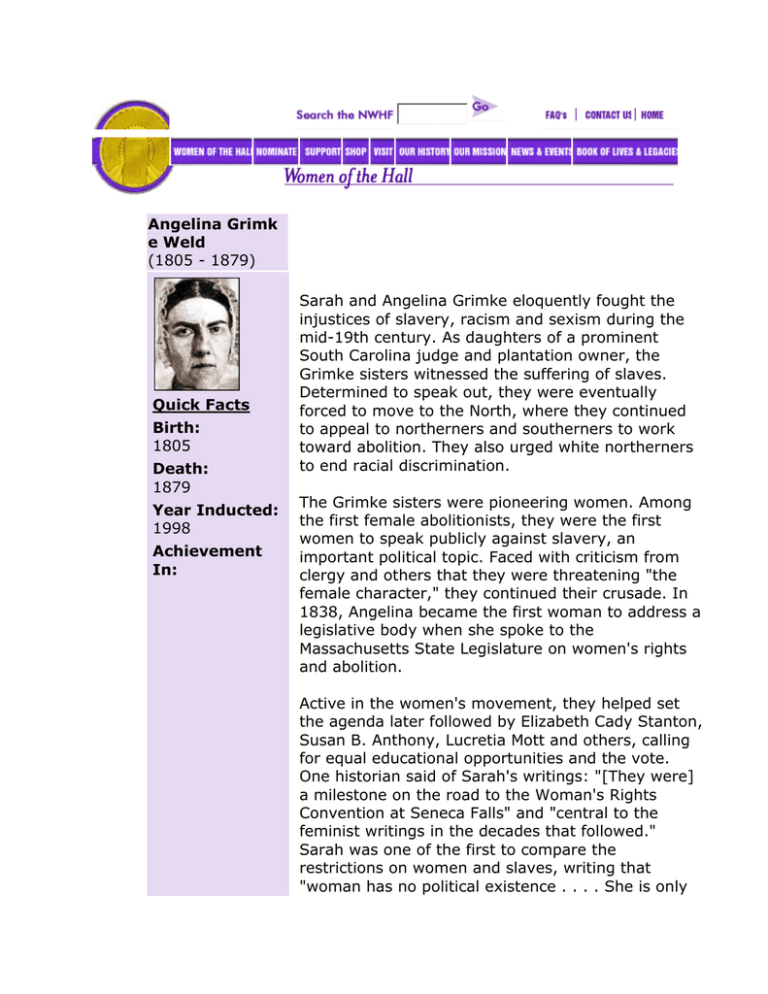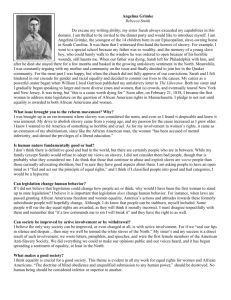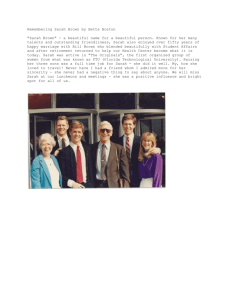The Grimke sisters were pioneering women. Among
advertisement

Angelina Grimk e Weld (1805 - 1879) Quick Facts Birth: 1805 Death: 1879 Year Inducted: 1998 Achievement In: Sarah and Angelina Grimke eloquently fought the injustices of slavery, racism and sexism during the mid-19th century. As daughters of a prominent South Carolina judge and plantation owner, the Grimke sisters witnessed the suffering of slaves. Determined to speak out, they were eventually forced to move to the North, where they continued to appeal to northerners and southerners to work toward abolition. They also urged white northerners to end racial discrimination. The Grimke sisters were pioneering women. Among the first female abolitionists, they were the first women to speak publicly against slavery, an important political topic. Faced with criticism from clergy and others that they were threatening "the female character," they continued their crusade. In 1838, Angelina became the first woman to address a legislative body when she spoke to the Massachusetts State Legislature on women's rights and abolition. Active in the women's movement, they helped set the agenda later followed by Elizabeth Cady Stanton, Susan B. Anthony, Lucretia Mott and others, calling for equal educational opportunities and the vote. One historian said of Sarah's writings: "[They were] a milestone on the road to the Woman's Rights Convention at Seneca Falls" and "central to the feminist writings in the decades that followed." Sarah was one of the first to compare the restrictions on women and slaves, writing that "woman has no political existence . . . . She is only counted like the slaves of the south, to swell the number of lawmakers." After the Civil War, they continued to champion the causes of equality and women's rights. Through their examples and their words, the Grimke sisters proved that women could affect the course of political events and have a far-reaching influence on society. Additional Resources:Lerner, Gerda The Grimke Sister from South Carolina: pioneers for women's rights and abolition. New York: Schocken Books, 1971. NOTES: "Studies in the life of women" series. "First Schocken Paperback edition 1971." Bibliography: p.[380]-385. Birney, Catherine H. The Grimke Sisters. Greenwood Publishing Group, 1969. Willimon, William H. Turning the World Upside Down; the story of Sarah and Angelina Grimke. Sandlapper Pres, 1972. NOTES: Juvenile literature. Edited by Gerda Lerner. The Feminist Thought of Sara Grimke Oxford University Press, 1997. An Epistle tot he Clergy of the Southern States. New York: 1836. Letters ont he Equality of the Sexes and the Condition of Woman. 1838. The Papers of Archibald Henry Grimke, ca. 18681930, 43 boxes. Howard University, MoorlandSpingarn Research Center, Manuscript Division. Washington, D.C. Du Pre Lumpkin The Emancipation of Angelina Grimke University of North Carolina Press, 1974. Appeal to the Christian Women of the South. Ayer Co. Pub., 1969. Originally printed New York: American anti-slavery society, 1836. Appeal to the Women of the Nominally Free States. 1837. Papers 1887-1958, 13 boxes. Howard University, Moorland-Spingarn Research Center, Manuscript Division. Washington, D.C. National Women's Hall of Fame 76 Fall Street P.O. Box 335, Seneca Falls, NY 13148 Phone 315.568.8060 Photo Credits Sarah and Angelina Grimke eloquently fought the injustices of slavery, racism and sexism during the mid19th century. As daughters of a prominent South Carolina judge and plantation owner, the Grimke sisters witnessed the suffering of slaves. Determined to speak out, they were eventually forced to move to the North, where they continued to appeal to northerners and southerners to work toward abolition. They also urged white northerners to end racial discrimination. The Grimke sisters were pioneering women. Among the first female abolitionists, they were the first women to speak publicly against slavery, an important political topic. Faced with criticism from clergy and others that they were threatening "the female character," they continued their crusade. In 1838, Angelina became the first woman to address a legislative body when she spoke to the Massachusetts State Legislature on women's rights and abolition. Active in the women's movement, they helped set the agenda later followed by Elizabeth Cady Stanton, Susan B. Anthony, Lucretia Mott and others, calling for equal educational opportunities and the vote. One historian said of Sarah's writings: "[They were] a milestone on the road to the Woman's Rights Convention at Seneca Falls" and "central to the feminist writings in the decades that followed." Sarah was one of the first to compare the restrictions on women and slaves, writing that "woman has no political existence . . . . She is only counted like the slaves of the south, to swell the number of lawmakers." After the Civil War, they continued to champion the causes of equality and women's rights. Through their examples and their words, the Grimke sisters proved that women could affect the course of political events and have a far-reaching influence on society. "Whatever is morally right for a man to do, it is morally right for a woman to do. I recognize no rights but human rights. I know nothing of men's rights and women's right; for in Christ Jesus, there is neither male nor female." - Angeline Grimke Angelina Grimke Weld; (1805-1879) Sarah Grimke; (1792-1873) The Grimke sisters of South Carolina were two early female abolitionists and women's rights activists, traveling throughout the North lecturing about their first-hand experiences with slavery on their family plantation. Their father, a strong believer of slavery and the subordination of woman was someone they did not want to represent. Receiving abuse and criticism for their abolitionist doings, they both realized that women would have to create their own medium of communication if they wanted to be effective abolitionists and reformers. Sarah Grimke, the eldest of the two was an abolistionist from an early age, she tried to escape from home when she first saw a slave being whipped at age five. As an early feminist, she desired to become an attorney like her father had first been before he became the Supreme Court Justice of South Carolina. Seeing how their father treated women, and slaves inspired her to stop others from imitating this behavior. Angelina being born thirteen years later, forced Sarah to play the mother and sister role in her life. At age 26, their father died in Philadelphia, and while there she became interested in the Quaker movement. After returning home, she influenced Angelina, and then she too converted to the Quaker faith in 1829. Being among the earliest abolitionists, Quakers also advocated equality for women. The same very strict religious and moral constraints imposed on men were imposed on women. However, Quaker women were permitted to speak out publicly and participate equally with men in church affairs. Also, their formal education was encouraged. The Quaker code provided the right fit for the Grimke sisters who joined the Philadelphia Female Anti-Slavery Society founded by Lucretia Mott. Through both organizations, they met other women who gathered petitions to Congress to abolish slavery and who even sold abolitionist pamphlets to pedestrians on the streets. The Grimkes were swept up in the movement. They spoke not only against slavery, but the exclusion of women from public life. In 1836, Angelina wrote "An Appeal to the Christian Women of the South" which was published by the American Anti-Slavery Society. They became agents for the Society and spoke on its behalf to small private gatherings throughout the Northeast called parlour talks. They were so popular that before long the sisters were speaking to larger groups. In 1837, for the first time they addressed a mixed audience of men and women, which was regarded as a huge step. By 1838, thousands of people flocked to hear their Boston lecture series. Angelina married the great feminist and abolitionist Theodore Weld. Initially both Weld's planned for Angelina to remain active in the abolitionist movement. But the time demands of running a home and being a wife and mother, forced Angelina to retire from public life. Sarah moved in with her sister and also retired from public life. Although they were no longer publicly active, they remained privately active committed abolitionists and feminists. From then on they led their lives comfortably and knowing they had made a difference in society. Sarah died in 1873, and six years later so did her sister. Sarah Angelina When the American Anti-Slavery Society organized a group of “Agents” to tour and speak about slavery, Angelina and Sarah Grimké were among them. Beginning in late 1836, both began speaking to women in private New York City parlors. By the end of the year, their audiences had grown so large that they had to hold their lectures in churches to accommodate everyone. The sisters moved on to Boston in the middle of 1837, where intense debates between abolitionists were already in progress. Sarah wrote a series of essays that ended up as a pamphlet, Letters on the Equality of the Sexes and the Condition of Women. In summer of 1837, a “Pastoral Letter” was published by ministers of Massachusetts, attacking the politically active Grimké sisters as unwomanly. The sisters had always criticized slavery in the context of their religions faith; but after this attack, they began to claim that women were moral individuals with as much right to take political positions as men had. The term feminist was not yet in use, but feminist ideas definitely shaped the beliefs of Sarah and Angelina Grimké. http://hubpages.com/hub/Political-Women-in-History-The-Grimke-Sisters http://www.gale.cengage.com/free_resources/whm/bio/grimk_sisters.htm Sarah Grimké, Angelina Grimké 1792-1873, 1805-1879 American abolitionists and social activists Daughters of a South Carolina slave-holding family, the Grimké sisters helped pioneer the antislavery and women's rights movements in the United States. Introduction Sarah Moore Grimké was born on November 26, 1792, in Charleston, South Carolina. Her sister, Angelina Emily, was born thirteen years later on November 26, 1805. Despite their age difference (perhaps even because of it), Sarah and Angelina were from the beginning as close as any two sisters can be. More than best friends, Sarah and Angelina lived with each other all of their lives, with Sarah acting as a sort of substitute mother to Angelina during their childhood. Each sister possessed a strong mind and kind soul and, in spite of growing up in a maledominated, slave-holding southern family, the two shared the belief that all people are created equal. Unlikely abolitionists Sarah and Angelina grew up in a prominent Charleston family. Their father, Judge John Faucheraud Grimké, fought in the Revolutionary War, served in the South Carolina state legislature as well as on the state's highest court, and operated a thriving cotton plantation. Their mother, Mary Smith Grimké, came from a wealthy, upper-class Charleston family. The Grimkés lived alternately between a fashionable townhouse in Charleston and the sprawling Beaufort plantation in the country. Like other large plantation owners, they kept scores of slaves, who did all the labor at Beaufort, from cotton picking to cooking to caring for the children. Slaves worked as nursemaids to the Grimkés' fourteen children and, in addition, each child was assigned a "constant companion," a slave child of about the same age who catered to his or her needs. Even as a child, Sarah was uneasy about her family owning slaves and she never considered her "companion" anything less than her equal. The slave girl died suddenly when both were about eight, and a heartbroken Sarah refused to accept another in her place. Sarah's childhood Until Angelina came along, Sarah grew up lonely. She said of those days: "We had many outdoor enjoyments ... I, however, always had one terrible drawback. Slavery was a millstone about my neck, and marred my comfort from the time I can remember myself" (Lerner, p. 28). Not only was Sarah upset by the suffering of the slaves she saw all around her, but she was virtually alone in her views on the subject. Further, she felt cheated intellectually. Her father, a very well-educated lawyer, taught Sarah, along with her brother Thomas, much about the law. Sarah learned to debate along with her brothers at home and secretly studied Thomas's school lessons at night. But girls were not allowed a secondary education in those days and when Thomas went off to law school at Yale, Sarah had to remain at home. Her father remarked that if Sarah had only been a boy, "she would have made the greatest jurist in the country" (Lerner, p. 25). Disappointed that she could not pursue an education, at age twelve Sarah turned her attentions to home and church. Sisters in suffering The Grimkés were a very religious family and attended Episcopal services every Sunday. Several days a week Sarah and her sisters also taught Bible classes, in which they read Biblical stories to slave children. But the young women were not allowed to teach the slaves to read the stories themselves, for this was against the law in 1805. Sarah continually questioned why the slaves should have to learn the Gospel second hand and saw no reason that she should not teach her students to read the Bible for themselves. While Sarah dared not break the law in public, she admittedly took great pleasure in secretly teaching her waiting-maid to read at night. She said proudly, "The light was put out, the keyhole screened, and flat on our stomachs, before the fire, with the spelling-book under our eyes, we defied the laws of South Carolina" (Lerner, p. 32). However, Judge Grimké caught Sarah and her maid one night and severely punished the two for their actions. Though he spared the maid from being whipped, he delivered to Sarah a stern lecture on the laws of the land. The episode broke Sarah's spirit for a time. She remained very quiet and somber until the birth of Angelina some months later. Angelina's birth Just turning thirteen and feeling rejected by the outside world, Sarah welcomed the arrival of her youngest sister. She saw in Angelina — "Nina" as she called her — the opportunity to be useful, to be needed. Her mother was worn out from the demands of her huge household and from bearing fourteen children (three of whom had died in infancy, leaving her quite grief stricken). Sarah begged to become Angelina's godmother. Her parents agreed, and from that day forward, Sarah assumed a responsibility for her youngest sibling that she would never give up. Angelina grows up As Angelina grew older under the watchful eye and loving influence of Sarah, she too struggled with the issue of slavery. During her early childhood, she attended a seminary for daughters of wealthy landowners. One day, Angelina fainted in class and Sarah was called in to retrieve her. When Angelina recovered, she told her sister that the sight of a slave child at the school had made her faint. About the same age as Angelina, the little slave boy had come to open a window but could barely walk to the front of the room. Staggering, he finally reached it and when he turned, Angelina saw that his small body was covered with whip marks. The wounds on his legs and back still bled. In retelling the story, Angelina wept. Sarah tried to comfort Angelina but not much could be said; Sarah did not understand the cruel treatment of slaves either. She had merely learned that, as a young woman, she was basically powerless to change conditions in the South. Father dies By 1818, as Sarah turned twenty-six and Angelina entered her teens, their father had become deathly ill. Sarah was sent alone to accompany her father to Philadelphia, Pennsylvania, in search of a cure. In June 1919, the two left Philadelphia for the Atlantic coast in hopes that the sea air would do the ailing man some good. But it was too late — Judge Grimké died in Bordentown, New Jersey, by his daughter's side. During the months that Judge Grimké hovered between life and death, he leaned on Sarah heavily and drew upon her strength. The two grew so close that they "became fast friends indeed" and Sarah regarded this "as the greatest blessing ... that I have ever received from God" (Lerner, p. 62). She was also on her own for the first time in the big city of Philadelphia, and the trip was a major turning point in Sarah's life. It opened her eyes to life in the North, outside of slavery. It also introduced her to the Quaker religion. Quaker conversion Sarah remained in Philadelphia for a few months after her father's death and, while waiting for a ship back to Charleston, she met some members of the city's Quaker Society of Friends. The Friends introduced Sarah to the works of Quaker leader John Woolman, and she was immediately inspired by his message. In his writings, Woolman strongly condemned slavery as evil and encouraged action against it. He, like Sarah, believed all people to be equal and was among the first to link the discrimination blacks faced in the North to the slavery of the South. Sarah identified with his message and began considering joining the church. Drawn to its antislavery doctrine, Sarah also was attracted to the fact that Quakers allowed women to become leaders within the church. Female preachers were common and Sarah thought that could be her calling. She did not convert immediately, however, but rather returned home to weigh her decision. Upon her return, Sarah found the South unbearable. Having spent nearly a year in the North, she realized she could no longer live in the presence of slavery, even if it meant she had to move away from her family. "After being gone for many months in Pennsylvania," she wrote, "when I went back it seemed as if the sight of [the slaves'] condition was insupportable, it burst my mind with new horror" (Lerner, p. 72). Within a month of her return and against her mother's wishes, Sarah packed her bags and moved permanently to Philadelphia, joining the Quaker Society of Friends. Angelina's conversion When Sarah made her exit, Angelina became the leader of the Charleston household. With their father deceased and the Grimké sons married or off at school, Angelina was left to look out for her mother and sisters and manage daily operations of the cotton plantation. However, she continually clashed with her mother over the issue of slavery. Angelina begged her mother to set her servants free — especially after the death of her father — but her pleas were unsuccessful. Her mother, deeply rooted in southern culture, saw nothing wrong with the practice of keeping slaves. Angelina considered joining her sister in the North. When Sarah returned to Charleston for a visit in 1827, Angelina was impressed by the simplicity of her sister's Quaker dress and lifestyle. She was also taken with the Quaker philosophy of nonviolence; they refused to act violently, even in self-defense. As Sarah prepared to return to Philadelphia, Angelina decided she also would convert to the Quaker religion. But she felt that staying in the South might help persuade other southerners to see the evils of slavery. Angelina remained in Charleston for a few more months, attempting to convert friends and family members. But the time finally came when she could no longer tolerate living with slavery and, in November 1829, she joined her sister in the North. Quakers and abolitionists In Philadelphia, Sarah and Angelina became active in the Quaker church and the abolitionist cause, teaching weekly prayer meetings and doing local charity work. Sarah studied to become a member of the clergy and Angelina attempted to further her education. The church, however, did not prove to be entirely in favor of either effort. Angelina decided to become a teacher and traveled to Hartford, Connecticut, to apply to attend Catherine Beecher's famous female seminary. Upon acceptance to the school, she returned to Philadelphia to get permission from the church to move. But the Quakers disapproved and denied her permission to go. Instead they offered her a teaching position in a Quaker infant school in Philadelphia. Angelina agreed but was not satisfied. Similarly, Sarah's dream of becoming a preacher was crushed. She was continually discouraged by the men of the Philadelphia Society of Friends and finally gave up when one church elder rudely interrupted one of her prayer meetings. The sisters were beginning to realize that belonging to the church was not the way to satisfy their dreams. Explosive events Meanwhile, in the country at large, explosive events were taking place. Antislavery speakers were flooding the East Coast with their messages, which included emancipation, or freedom for the slaves; abolition, or the end of slavery altogether; and recolonization, or sending the nation's black population back to Africa. By 1832, both sisters had become very discouraged by their limited roles within the Philadelphia branch of the Quaker church. The women longed to be more involved in the slavery issue; after all, that was why they moved north in the first place. Three events gave them freedom from some responsibilities and allowed them to more actively fight slavery. First, Sarah refused to marry the Quaker man who had been instrumental in her conversion, fearing she would become more of a slave than a partner in marriage. Next, Angelina's fiance died suddenly in an epidemic. And finally, their dear brother Thomas, who also had been working for emancipation, died. With marriage possibilities and family ties cut, Sarah and Angelina felt they had nothing to prevent them from joining the abolitionists and putting all their efforts into working for the abolition of slavery. The letter Reading in William Lloyd Garrison's newspaper, The Liberator, of the formation of the American Anti-Slavery Society (AASS) in 1833, Angelina rushed to support his efforts. The Garrison-led AASS was the first interracial society that supported immediate emancipation of slaves, boldly declaring that "the Negro, free or slave, was a human being and a citizen and was to be considered as such" (Lerner, p. 160). Angelina attended AASS meetings in Philadelphia and became a member of the society's committee for the improvement of people of color. As race riots began erupting throughout East Coast cities, Angelina felt compelled to become more deeply involved in Garrison's movement. On August 30, 1835, with a stroke of her pen, Angelina changed the sisters' lives forever. Though she had never met Garrison, Angelina wrote him a letter, that began, "I can hardly express to thee the deep and solemn interest with which I have viewed the violent proceedings of the last few weeks." She told Garrison to keep up the fight and volunteered to join him, saying, "This is a cause worth dying for" (Lerner, p. 174). Without Angelina's permission, Garrison reprinted her moving letter in The Liberator, saying that he "could not, dared not suppress it" (Lerner, p. 174). The response to Angelina's letter was overwhelming, and at once Angelina and Sarah were thrust to the front lines of the fight against slavery. The Philadelphia Quakers were outraged by Angelina's act (Quakers were supposed to receive permission from the church before doing anything on their own), but the antislavery community embraced the sisters. At last they had found their calling. Antislavery activities Angelina's letter was reprinted in all the major reform newspapers of the day and was printed with Garrison's Appeal to the Citizens of Boston and the Quaker abolitionist poet John Greenleaf Whittier's antislavery poem Stanzas for the Time in a widely circulated pamphlet. Angelina stepped up her efforts in the AASS, participating in its antislavery conventions. Sarah supported more moderate activities such as the "Free Produce" movement — a call to boycott, or stop buying, products made by slaves — which began with her Quaker mentor, John Woolman. As a result of their new-found friends and activities, the sisters moved from Philadelphia to Providence, Rhode Island, to be with a looser, more liberal group of Quakers. Power of the pen In early 1836, from their new home in Rhode Island, Sarah and Angelina began to write a series of antislavery pamphlets and books. Angelina wrote An Appeal to the Christian Women of the South and Sarah produced An Epistle to the Clergy of the Southern States, followed by An Address to Free Colored Americans. These powerful works, which for the first time were written by southerners for southerners, had a huge impact. Because the women had grown up in the South and came from such a respectable family, southern folk at least considered reading what the sisters had to say. Angelina's Clergy, for example, declared that slavery was "opposed to Christian principles and to everything Jesus had taught" (Lacy, p. 74). The sisters also spoke out in favor of women working for abolition, saying that throughout the Bible there are examples of women taking public stands on important issues. Following publication of their work, Sarah and Angelina were invited to speak throughout the Northeast. They addressed Anti-Slavery Society conventions in New York, Pennsylvania, Rhode Island, and Massachusetts and met all the famous abolitionists of the day, including Theodore Weld, who later married Angelina. Weld helped polish the sisters' public-speaking skills and in 1837 Sarah and Angelina began a twenty-three week lecture tour for the abolition movement. The tour Financing the trip themselves, the sisters visited sixty-seven cities, breaking new ground for women as public speakers. Up to this time, it was virtually unheard of for women to address audiences with both men and women in attendance and even fewer were so outspoken on the most controversial issues of the day. While they received praise from many for their courageous stand against slavery, the sisters also suffered countless attacks on their character. Congregational ministers blasted the Grimkés in a public letter, saying that a woman becomes "unnatural" when she "assumes the place and tone of a man" (Cooper, p. 59). Even Catherine Beecher, who herself ran a groundbreaking women's school, criticized the sisters' lecture tour. Like others, she felt it was not a "woman's place" to speak in public. Because of the controversy their tour created, the sisters became aware of the overwhelming parallels between women's and slaves' role in society. Both were denied the right to vote and the right to a secondary education, and both were treated as second-class citizens. Sarah soon became convinced that until women were themselves completely free, they could not effectively work for the rights of others. Thus, Sarah was prompted to write Equality of the Sexes, the first document to link slavery to the unequal treatment of women. Sarah did not wish to suggest "that the condition of free women can be compared to that of slaves in suffering or degradation" (Cooper, p. 62); rather, women faced the same limitations as slaves in education and work opportunity and so had a special duty to fight against slavery. Sarah further insisted that women's domestic duties did not weaken their ability to succeed in the public arena and suggested to women that the claim to stand on perfect equality with men could only be proven by "scrupulous attention to our domestic duties" (Cooper, p. 61). Sarah realized women would have to play dual roles in society in order to be accepted in the public arena. Angelina addresses the Massachusetts legislature Angelina finished the year-long speaking tour with an address to the Massachusetts state legislature, becoming the first woman in U.S. history to speak to a legislative body. Afterward, both sisters returned to Providence for a much-deserved rest. After the grueling tour, Angelina was physically exhausted, but she also was in love. She and Theodore were married in a very simple ceremony, with Theodore renouncing all claims to Angelina's property and Angelina omitting the line "to obey" from her wedding vows. Both black and white Americans attended the ceremony, including William Lloyd Garrison and black schoolteacher and abolitionist Sarah Mapps Douglass. The Philadelphia Society of Friends officially expelled Angelina for marrying a non-Quaker and Sarah for attending the wedding. Within the next two years, Theodore, Angelina, and Sarah all moved to a farm in New Jersey. The sisters were determined to pay "scrupulous attention to domestic duties" and show that active women could be good mothers and efficient housekeepers without the help of slaves. After 1839, the sisters concentrated on raising Angelina's children and tending their farm and home. Sarah and Angelina tried to stay as active as they had been in civil rights causes before the marriage, but Angelina's ill health prevented it. The tour and subsequent bearing of children had severely weakened her. So instead of touring and lecturing, the sisters wrote articles and speeches for others to recite at antislavery and women's rights conventions. They also took as boarders a great many abolitionists who toured the East Coast, including Elizabeth Cady Stanton and her husband, Henry. The Civil War and afterward During the Civil War, the sisters wrote articles supporting the Union. In March 1863, they penned "An Appeal to the Women of the Republic," which urged women to rally to the cause of the Union and hold a convention to support the war effort. Angelina, now much stronger physically, addressed the convention, which was presided over by Lucy Stone, Stanton, and Susan B. Anthony. After the war the sisters and Theodore relocated to Hyde Park, a part of Boston, where they opened a coeducational school and continued to fight for minority rights. On March 7, 1870, when Sarah was seventy-nine and Angelina sixty-six, the sisters boldly declared a woman's right to vote under the fourteenth Amendment by depositing ballots in the local election. Along with forty-two women, Sarah and Angelina Marched in procession in a driving snowstorm to the polling place. They were jeered by many onlookers but, because of their age, were not arrested. The gesture did not change the law against women voting, but it did receive a lot of publicity and was for the sisters a final "act of faith" (Lerner, p. 535). Three years later, on December 23, 1873, Sarah died. Angelina suffered several strokes after Sarah's death, which left her paralyzed for the last six years of her life. She died on October 26, 1879. Theodore survived his wife by six years and died in 1885. The Grimké sisters had spent their years promoting equality and free speech. They did not seek special treatment for women or African Americans, but simply the equal opportunity to succeed. In the words of Sarah Grimké: "All I ask of our bretheren is that they will take their feet from off our necks and permit us to stand upright on the ground which God intended us to occupy" (Cooper, p. 62). : History Angelina Grimke was born on February 20, 1805 in Charleston, South Carolina. She was an abolitionist and advocate of women’s rights. Angelina and her older sister Sarah were daughters of a prominent South Carolina judge and plantation owner. The sisters often witnessed the suffering of slaves and were determined to speak out. They were eventually forced to move to the North, where they continued to appeal to northerners and southerners to work toward abolition. In 1836 Angelina wrote a letter against slavery to William Loyd Garrison, which he published in his newspaper, The Liberator. She followed this with the pamphlet, An Appeal to the Christian Women of the South, which called for Christian Women of the South to join the anti-slavery cause. Officials in South Carolina publicly burned the pamphlet and the sisters were warned that they would be arrested if they ever returned home. Invited to speak to female audiences, the Grimke sisters became the first and only women among the forty trained agents in the anti-slavery movement. The sisters began speaking around New York City and the audience was opened up to both sexes. Angelina developed into an orator of considerable power and in 1837 was invited to lecture in Massachusetts. The Grimke sisters were pioneering women. Among the first female abolitionists, they were the first women to speak publicly against slavery. Faced with criticism from clergy and others that they were threatening "the female character," they continued their crusade. In 1838, Angelina became the first woman to address a legislative body when she spoke to the Massachusetts State Legislature on women's rights and abolition. Active in the women's movement, the Grinke sisters helped set the agenda and paved the way for Elizabeth Cady Stanton, Susan B. Anthony, Lucretia Mott and others, calling for equal educational opportunities and the vote. Angelina’s life work was spent opposing prejudice, discrimination and oppression based on the philosophy of nonviolence. She promoted understanding, and mutual respect among all people through her writing and courageous spirit. The presence of the Grimke sisters on the public platform inspired a new generation of women to speak in public and to assert women’s presence in public lives. : People they may have impacted






